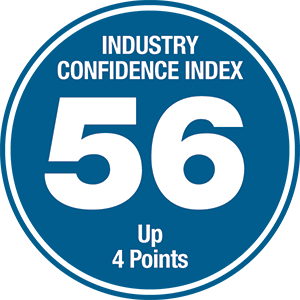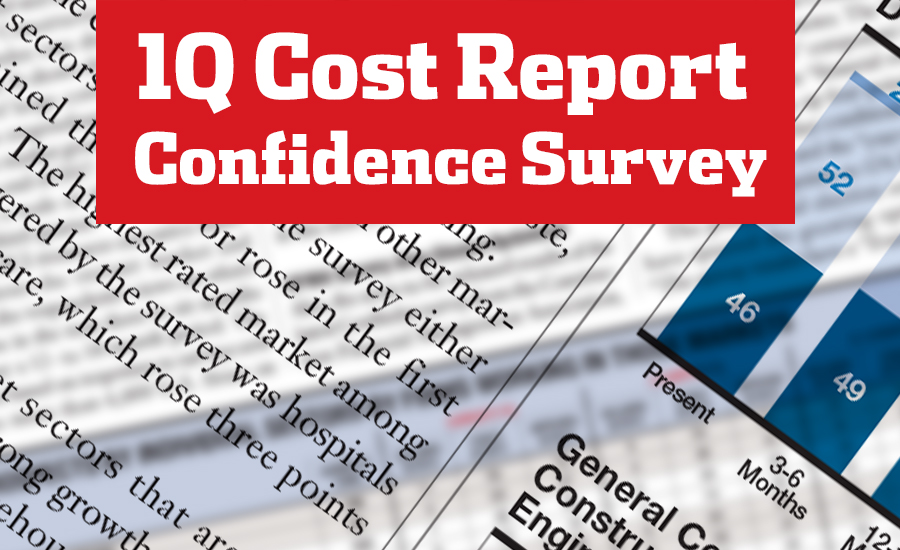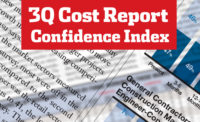The term “black swan” is used to indicate a sudden, unexpected event that usually has broad negative effects on the economy and society. Executives in the construction industry now are looking carefully at whether the sudden emergence of the new coronavirus may be the black swan that will bring a halt to the market's long boom.
The concern about the emergence of COVID-19, as the disease caused by the virus is known, has had surprisingly little impact on industry executives’ views of the construction market in the near term, at least as seen in the latest results of ENR’s latest Construction Industry Confidence Index survey.
It rose four points to 56 in the first quarter of 2020 from the fourth quarter of 2019—an especially surprising result given that 44% of the surveys came in after the media began heavy coverage of the health crisis.
 Of 244 executives from large construction and design firms responding to the survey, the 137 that answered the survey before Feb. 15, when the COVID-19 story began to gain traction, agreed with the 107 that answered after that date, showing CICI results for both at a healthy 56 market rating. Both groups anticipate continued market growth through the end of the year.
Of 244 executives from large construction and design firms responding to the survey, the 137 that answered the survey before Feb. 15, when the COVID-19 story began to gain traction, agreed with the 107 that answered after that date, showing CICI results for both at a healthy 56 market rating. Both groups anticipate continued market growth through the end of the year.
But the CICI rating for the overall economy tells a different story. Those answering the survey before Feb. 15 gave the U.S. economy a healthy 57 CICI rating, while those answering after Feb. 15 gave the economy an anemic 50 rating.
The index measures executive sentiment about the current market, where it will be in the next three to six months and over a 12- to 18-month period. A rating above 50 shows a growing market. The measure is based on responses to surveys sent between Jan. 21 and March 10 to 6,000 U.S. companies on ENR’s lists of leading general contractors, subcontractors and design firms.
Another barometer is the soon-to-be-released results of the latest Confindex survey from the Construction Financial Management Association (CFMA), which shows that chief financial officers are concerned about the market in the year ahead, but not as much as they were at this time last year.
|
Related Link |
CFMA: CFOs Watch Numbers
Each quarter, CFMA polls 200 CFOs from general and civil contractors and subcontractors about markets and business conditions. The Confindex is based on four separate financial and market components, each rated on a scale of 1 to 200. A rating of 100 indicates a stable market; higher ratings indicate market growth.
“The Confindex fell from 121 in the previous quarter to 120 in the current quarter,” says Stuart Binstock, CFMA’s CEO. He says three of the four components of the Confindex fell in the first quarter: “business conditions” fell from 121 to 116; “financial conditions” from 125 to 123; and the year-ahead outlook from 117 to 109, while “current conditions” was steady at 128. “While the Confindex is off on a quarterly basis, overall, it is 10.1% higher in this quarter than it was in the first quarter of 2019,” Binstock says.
Uncertainty Ahead
Underlying the market projections is concern about the effect of COVID-19 on the economy and the market, with industry execs now cautious about its impacts. A CEO of one large specialty contractor summed it up for many CICI survey participants: “I am actually more bullish than in my selections here, but given the hysteria from the virus deal, it’s hard to say what if any effect it will have.”
Absent the threat of COVID-19, the market appears to be in pretty good shape, says Anirban Basu, CEO of economic consultant Sage Policy Group, Baltimore, and a CFMA adviser.
However, he believes the reaction to the virus will have an impact on the construction market, regardless of whether the crisis is short lived. “The coronavirus has made the survey figures very difficult to interpret,” Basu contends. “It has shaken up the financial markets, which may lead to a softer economy.”
According to the economist, it does not matter whether the virus is a short-term scare. The financial markets already have reacted. “The U.S. Federal Reserve’s emergency move [on March 3] to cut interest rates by 50 basis points in reaction to financial concerns over the virus has spooked the stock market, rather than stimulating it,” he says.
From a construction standpoint, there may be some positives. The virus has stalled the Chinese economy, leading to an international drop in demand for energy and construction materials. “Gas prices are falling, and that helps the bottom lines of nearly every contractor,” Basu says. Oil prices took another hit on March 9 when Saudi Arabia announced a 25% increase in oil production, causing energy prices to crater.
This is seen in the CICI index, with only 50.8% of respondents saying they were seeing price pressure on materials and equipment, the lowest figure in years.
The market as it currently stands is strong, but external pressures from the impact of COVID-19 and the tumultuous oil market may end the construction boom. It depends on how long the virus crisis lasts.
“If we are still feeling the effects of COVID-19 in the summer, I expect we will see a whole different take on market optimism,” Basu says.






Post a comment to this article
Report Abusive Comment